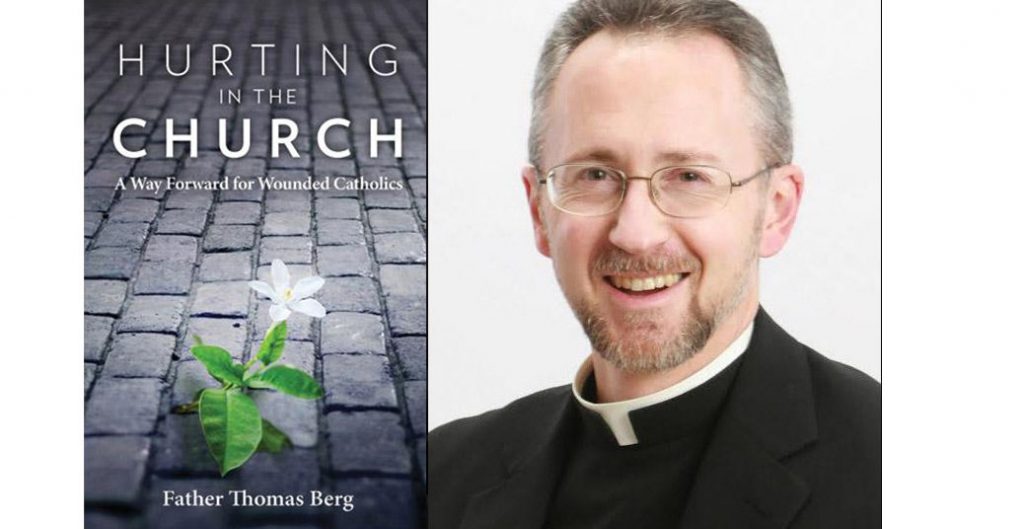“I know too many hurting Catholics,” Fr. Thomas Berg, a professor of moral theology and vice-rector at St. Joseph’s Seminary in New York, writes in his new book, Hurting in the Church: A Way Forward for Wounded Catholics. Born out of his experience of crisis in his former religious order and his acknowledgement of his own human wounds and shortcomings, the book is “an examination of conscience following the Year of Mercy … an invitation to reflect on those areas where we are sorely lacking in charity in our faith communities, an invitation to an essential conversion of heart, and to a renewal of the life of charity in our local churches.” He offers it as “a clarion call to Catholics to become healers ….” Contributing to “necessary transformation, purification and renewal.” He gives just a taste of the book in an interview.
Kathryn Jean Lopez: You talk about wounds — yours and others’. How do we go about reaching and healing when there is a sea of them, everywhere? What do they have to do with Christ’s glorified wounds (something Pope Francis has talked a bit about)?
Fr. Thomas Berg: When we reach out to help someone heal from emotional trauma, we can only do that one person at a time. But of course, we can also do things that have a broader impact: we can preach about it, and certainly write about it. I hope my book is just one small example of that. If enough of us talk about the elephant in the room—the frequent and often devastating failures in charity on the part of Catholics, especially those in leadership—if enough of us begin to say ‘no’ to cultures of hurt within the Church, if enough of us ask the grace to irradiate a visceral and passionate life of charity in our corner of the Church, then we might just become the Holy Spirit’s instruments for a revolution of charity within the Church.
We need that revolution. That’s the answer to the many wounds that remain in the Mystical Body. As I say in the book, those wounds are a scandal. But just as Christ’s wounds were also a scandal, ours two can become glorious—a glorious source of intimacy with Christ, a source of healing for others, a source of holiness.
Lopez: How can we be joyful in the midst of such deep wounds and suffering as you write about and too many people reading this know too well already? Why should we be?
Fr. Berg: We can remain joyful if we keep our eyes on Jesus. He is always the source of joy to those who turn to him. We should be joyful because no matter what is happening within the Church on the human level, no matter what sinfulness, failures, omissions or dysfunction: He remains the Savior, and he remains powerfully active in our lives. Again, as Archbishop Chaput suggests, the Christian looks at reality, not with optimism—since there might not be reasons for optimism—but with hope, hope in the presence, consolation, and salvific action of our Lord and Savior Jesus Christ.
Lopez: Why is holiness “awkward” and how can it and why must it be recovered?
Fr. Berg: Well, it is awkward when what holiness requires of us places us is counter-cultural, when the demands of Christian witness are at odds with the ways of the world. But if we are living genuinely Christian lives in contemporary American culture, I don’t know how things can’t but get really uncomfortable at times. But that’s okay. That’s they way it should feel. The important thing is that Christian witness be attempted with humility and with genuine love for the other, and as far as possible, connecting with others where they are at, not overwhelming them, but simply offering the example of Christian goodness. That’s the challenge today, that’s been the challenge always. It’s just that somewhere along the line, we’ve gotten the message that living the Gospel is supposed to be comfortable—almost always. What we have to recover is the sense that discipleship will have a cost, that it should be forcing us out of our comfort zones and into the messiness of people’s lives, and there to offer the love of Jesus, but what may the response.
Lopez: Why is Pope Francis’s description of the Church as a “field hospital” so crucial?
Fr. Berg: Well, it’s an image that works so well to get at the reality of our situation. As I assert in the book, we are largely a Church of the hurting, and in myriad ways. Our first concern has to be the wounds—the deepest wounds that afflict the people of God. We can get to the other issues—their disagreements about Church teaching, their moral confusions, their misunderstandings of liturgy, their lack of catechesis—we can get to all that eventually. But first we have to respond to the ways they have been hurt by their experience of the Church.
Lopez: Can we really have a “revolution of tenderness” as Pope Francis has urged and you endorse in this day and age?
Fr. Berg: I would like to hope so. I think there is a flame that can be caught. I hope my book can possibly help ignite that flame. But certainly each one of us, with the Holy Spirit’s help, can unleash our own individual revolution of tenderness in our corner of the Church.

